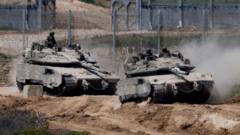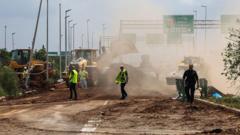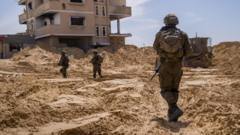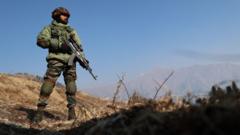In a marked escalation of regional tensions, Israel has launched airstrikes against Houthi targets in Yemen as retaliation for missile fire aimed at Ben Gurion airport.
Israel Responds to Houthi Missile Threats with Airstrikes in Yemen
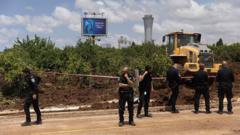
Israel Responds to Houthi Missile Threats with Airstrikes in Yemen
Israel targets Houthi positions in Yemen following missile attack near Ben Gurion Airport.
Israel's military, known as the IDF, confirmed that airstrikes were executed targeting key Houthi locations, specifically in the port city of Hudaydah, after the Iran-backed group launched missiles towards Israel on Sunday. The IDF's focus included sites believed to be pivotal supply chains for the Houthis, notably the Hudaydah Port and the Bajil cement factory, which authorities claim are linked to the construction of military infrastructure.
The missile attack on Ben Gurion airport, which occurred on Sunday, resulted in injuries to six individuals. Following this hostile act, the Houthis issued a statement indicating plans to impose "a comprehensive aerial blockade" against Israel by attacking airports in retaliation for perceived escalations in Gaza. The group maintains that the follow-up airstrikes on Monday were a direct result of Israeli-American aggression, a claim which the US has denied, stating that its forces did not participate in the strikes.
Reports indicate that civilian areas around the port were targeted during these strikes, with at least 21 individuals reportedly injured, according to Houthi health officials. The strikes also included specific attacks on the Bajil cement factory, said to serve as a significant economic asset for the Houthis. The IDF emphasized their precision in conducting the attacks with considerations to limit impacts on maritime vessels.
Prime Minister Benjamin Netanyahu reaffirmed Israel's commitment to defending itself against threats, pledging further military responses if necessary. These events contribute to a broader narrative of escalating hostilities tied to Iran's influence in the region, with the US also engaging militarily against the Houthis amidst the ongoing unrest in Yemen.
This fresh cycle of strikes highlights the precarious balance of power in the Middle East, with each action continuing to pose risks for diplomatic stability in the region.
The missile attack on Ben Gurion airport, which occurred on Sunday, resulted in injuries to six individuals. Following this hostile act, the Houthis issued a statement indicating plans to impose "a comprehensive aerial blockade" against Israel by attacking airports in retaliation for perceived escalations in Gaza. The group maintains that the follow-up airstrikes on Monday were a direct result of Israeli-American aggression, a claim which the US has denied, stating that its forces did not participate in the strikes.
Reports indicate that civilian areas around the port were targeted during these strikes, with at least 21 individuals reportedly injured, according to Houthi health officials. The strikes also included specific attacks on the Bajil cement factory, said to serve as a significant economic asset for the Houthis. The IDF emphasized their precision in conducting the attacks with considerations to limit impacts on maritime vessels.
Prime Minister Benjamin Netanyahu reaffirmed Israel's commitment to defending itself against threats, pledging further military responses if necessary. These events contribute to a broader narrative of escalating hostilities tied to Iran's influence in the region, with the US also engaging militarily against the Houthis amidst the ongoing unrest in Yemen.
This fresh cycle of strikes highlights the precarious balance of power in the Middle East, with each action continuing to pose risks for diplomatic stability in the region.






